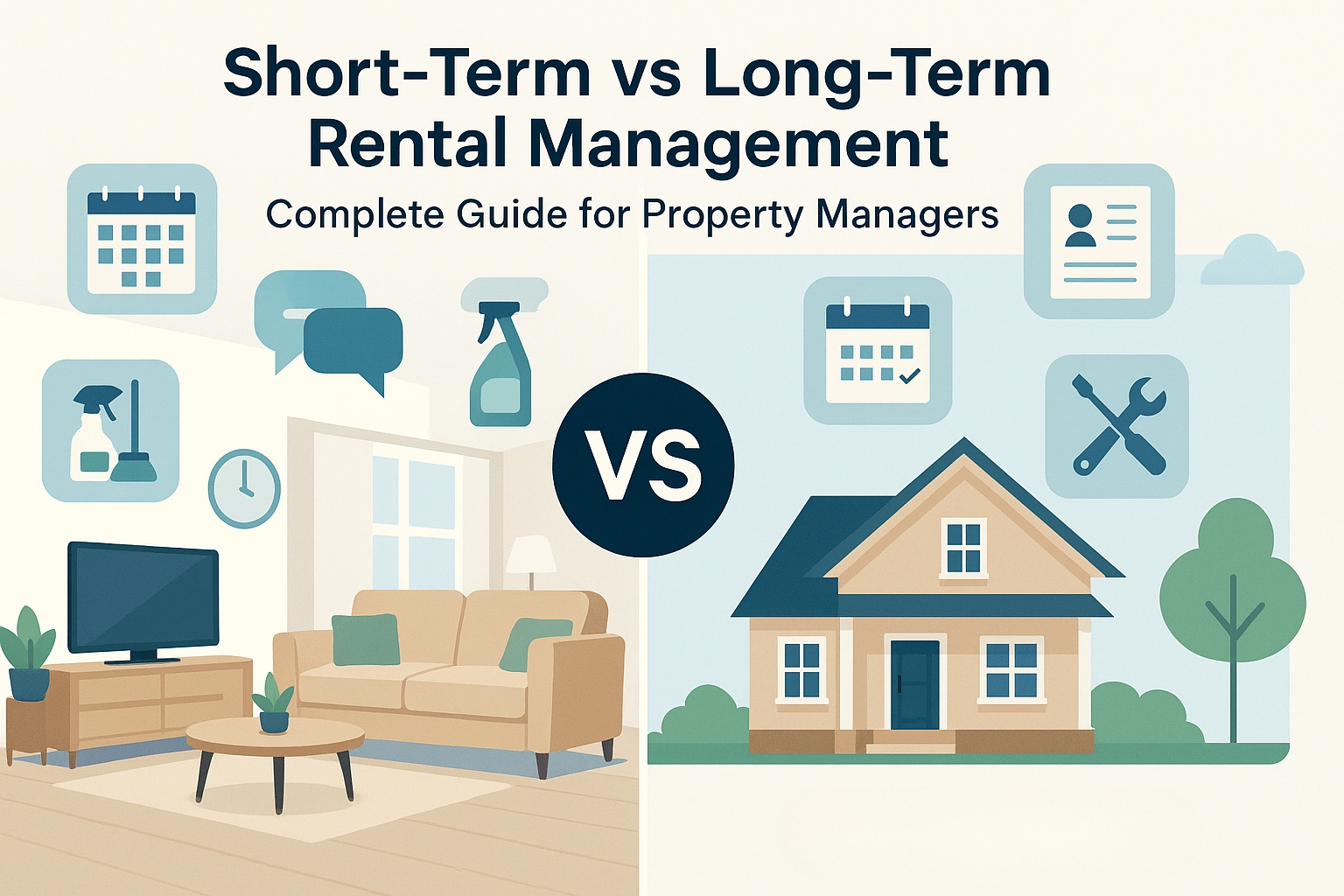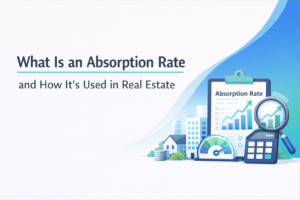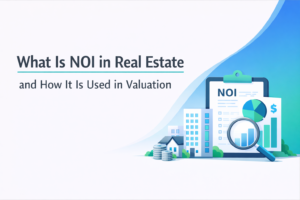
Should property managers offer short-term or long-term rental services? Property managers should offer both services based on client property locations and management capacity. Short-term rentals generate 20-30% management fees but require intensive daily operations, while long-term rentals offer 8-12% fees with scalable, predictable workflows.
The optimal choice depends on your team’s operational capacity, technology infrastructure, and client portfolio composition. Tourist destination properties favor short-term management, while residential areas typically perform better with long-term tenant services.
What is the difference between managing short-term and long-term rentals?
Short-term rental management involves daily guest communication, frequent property turnovers, and dynamic pricing optimization. Long-term rental management focuses on tenant placement, lease administration, and periodic maintenance coordination with significantly lower operational intensity.
What does short-term rental management involve daily?
Short-term rental management operates as a hospitality service business requiring:
- Guest communication: 24/7 inquiry response and booking coordination
- Property preparation: Cleaning and maintenance between every stay
- Revenue optimization: Dynamic pricing and availability management
- Issue resolution: Immediate response to guest problems and emergencies
- Platform management: Multi-channel listing updates and performance monitoring
Management complexity: 1 property manager typically handles 10-25 short-term units effectively.
What are long-term rental management responsibilities?
Long-term rental management involves tenant screening, lease administration, maintenance coordination, rent collection, and periodic property inspections with predictable monthly workflows.
Long-term rental management focuses on:
- Tenant lifecycle: Screening, placement, retention, and move-out coordination
- Financial administration: Rent collection, expense management, owner reporting
- Maintenance oversight: Scheduled inspections, work order management, vendor coordination
- Compliance management: Lease enforcement, legal procedures, regulatory adherence
- Portfolio optimization: Market analysis, rent adjustments, property improvements
Management efficiency: 1 property manager can effectively oversee 50-200+ long-term units.
Which rental management strategy generates higher revenue for property management companies?
Short-term rental management generates 2-3x higher per-unit revenue through 20-30% management fees, but long-term management offers better scalability and profit margins due to operational efficiency and volume potential.
How do short-term rental management fees compare?
Short-term rental management commands premium fees due to operational intensity:
Fee structure advantages:
- Management fees: 20-30% of gross rental revenue
- Setup fees: $500-2,000 per property onboarding
- Additional services: Cleaning coordination, maintenance, guest services
- Performance bonuses: Revenue optimization incentives
- Technology fees: Platform management and software subscriptions
Revenue example: A property generating $5,000/month provides $1,250-1,500 monthly management income.
Why do long-term rentals offer better profit margins?
Long-term rental management provides superior profit margins through operational efficiency, allowing property managers to serve 5-10x more units per employee while maintaining consistent 8-12% management fees.
Profit advantages:
- Scalable operations: Standardized processes across large portfolios
- Predictable workflows: Monthly cycles rather than daily management
- Lower labor costs: Fewer staff required per managed unit
- Technology leverage: Automated systems for routine tasks
- Steady income: Consistent fees regardless of seasonal fluctuations
What are the biggest operational challenges for short-term rental managers?
The primary challenges include managing 24/7 guest communication, coordinating frequent property turnovers, maintaining consistent service quality across multiple properties, and optimizing revenue through dynamic pricing strategies.
How do you handle guest communication efficiently?
Guest communication challenges:
- Volume management: Multiple inquiries and bookings daily per property
- Response time expectations: Guests expect immediate replies (under 1 hour)
- Multi-language support: International guests requiring language accommodation
- Emergency availability: 24/7 contact for urgent guest issues
- Review management: Proactive guest satisfaction and reputation monitoring
Solution requirements: Modern property management platforms now integrate automated messaging systems, standardized response templates, and centralized communication hubs. The most effective solutions allow property managers to create bookings in seconds while automatically handling guest communications across multiple channels, significantly reducing response times and improving guest satisfaction.
What makes property turnover management complex?
Turnover coordination challenges:
- Tight scheduling: Same-day checkout and check-in coordination
- Quality control: Consistent cleaning and maintenance standards
- Inventory management: Linens, amenities, and supply restocking
- Inspection protocols: Damage assessment and maintenance needs
- Vendor coordination: Cleaning teams, maintenance staff, and suppliers
Operational needs: Advanced vacation rental management software now provides integrated scheduling systems with mobile inspection tools and automated vendor coordination. The best platforms organize properties with detailed unit profiles that capture amenities, specifications, and maintenance requirements, enabling property managers to streamline turnover processes and maintain consistent quality standards across their entire portfolio.
What technology do property managers need for short-term rentals?
Successful short-term rental management requires integrated software for booking management, automated payment processing, guest communication, cleaning coordination, and financial reporting with multi-platform synchronization.
What are essential short-term rental management features?
Core technology requirements:
- Comprehensive booking management: Modern platforms allow you to define various rental unit types with customizable parameters and generate new bookings with just a few clicks
- Automated payment processing: Advanced systems automatically create rent and fee payments for each booking, integrating seamlessly with accounting systems like NetSuite and Xero
- Intelligent property organization: Professional software lets you organize units by location, amenities, and key attributes while creating detailed property profiles
- Complete reservation tracking: Leading platforms monitor bookings through reserved, active, completed, and canceled stages with real-time status updates
- Financial integration: The best vacation rental management software connects directly to financial systems, ensuring consistent data across all platforms
Integration advantages: Top-tier solutions provide all-in-one vacation rental management from property definition to booking completion, eliminating the need for multiple fragmented systems while improving operational efficiency.
How does property management software reduce operational complexity?
Modern vacation rental management software eliminates manual processes through automated booking creation, intelligent payment generation, and comprehensive reservation tracking, reducing management time by 60-70% while improving accuracy and guest satisfaction.
Efficiency improvements achieved by leading platforms:
- Streamlined workflows: Professional software handles every step from property setup to checkout, replacing fragmented systems with solutions that simply work better
- Centralized operations: All-in-one platforms bring together property definition, booking creation, payment automation, and reservation tracking in one clean interface
- Real-time synchronization: Advanced systems provide complete lifecycle tracking, letting you see every booking from reserved to completed in one view
- Financial automation: Integrated solutions automatically generate and sync payments with accounting systems, providing financial clarity and reduced administrative overhead
- Scalable architecture: Professional-grade platforms adapt to your needs with custom workflows, growing seamlessly as your business expands
Professional advantage: The best short term rental management software is built specifically for property managers who want comprehensive functionality without unnecessary complexity, enabling teams to fill units faster with streamlined processes while achieving significantly higher occupancy rates.
What are the staffing requirements for different rental management types?
Short-term rental management requires 1 manager per 15-25 units due to daily operational intensity, while long-term management allows 1 manager per 75-150 units through standardized processes and seasonal workflows.
How do you scale short-term rental management operations?
Staffing structure for growth:
- Property managers: Direct guest communication and issue resolution
- Operations coordinators: Cleaning and maintenance scheduling
- Revenue managers: Pricing optimization and performance analysis
- Customer service: After-hours support and emergency response
- Administrative staff: Financial reporting and owner communication
Scaling challenges: Maintaining service quality while managing operational complexity across growing portfolios requires robust systems and standardized procedures.
What makes long-term rental management more scalable?
Operational efficiency factors:
- Predictable cycles: Monthly rent collection and quarterly inspections
- Standardized processes: Consistent tenant screening and lease procedures
- Technology leverage: Automated rent collection and maintenance requests
- Seasonal workflows: Move-out/move-in seasons with concentrated activity
- Vendor relationships: Established networks for maintenance and services
Scalability advantage: Proven systems allow rapid portfolio expansion without proportional staff increases.
How do you choose the right management strategy for client properties?
Choose short-term management for properties in tourist destinations with unique features and owner willingness to invest in furnishing. Select long-term management for residential properties with stable rental demand and owners seeking passive income.
What property characteristics favor short-term rental management?
Ideal short-term rental properties:
- Location advantages: Tourist destinations, business districts, event venues
- Property features: Unique architecture, premium amenities, desirable views
- Market conditions: Limited hotel inventory, high visitor demand, premium pricing
- Owner profile: Willing to invest in furnishing and accept income variability
- Regulatory environment: Permissive short-term rental regulations
When should property managers recommend long-term rentals?
Long-term rental indicators:
- Market characteristics: Strong residential demand, stable employment base
- Property type: Standard residential units in established neighborhoods
- Owner objectives: Passive income focus, minimal involvement preference
- Financial goals: Predictable cash flow, long-term wealth building
- Operational capacity: Limited management bandwidth for intensive oversight
What are the financial reporting differences between rental types?
Short-term rentals require daily revenue tracking, dynamic expense management, and complex tax reporting across multiple booking platforms. Long-term rentals use monthly financial cycles with predictable income and standardized expense categories.
How do you manage short-term rental financial complexity?
Financial management challenges:
- Revenue tracking: Multiple income streams from different booking platforms
- Expense allocation: Variable costs for cleaning, utilities, and maintenance
- Tax compliance: Occupancy taxes, business licenses, and multi-jurisdictional requirements
- Owner reporting: Detailed performance analytics and profit/loss statements
- Cash flow management: Seasonal variations and booking deposit handling
Modern solution capabilities: Today’s vacation rental management software addresses these challenges through automated payment generation based on booking details, integrated fee tracking for services and amenities, and seamless connections to NetSuite and Xero for comprehensive financial management. Professional platforms now provide complete visibility into revenue streams while simplifying payment collection processes with secure, integrated tools that accelerate decision-making through comprehensive booking analytics.
What makes long-term rental financial management simpler?
Administrative advantages:
- Predictable income: Fixed monthly rent with standard collection dates
- Standardized expenses: Routine maintenance, management fees, and predictable costs
- Simple tax reporting: Straightforward rental income and expense deductions
- Consistent cash flow: Monthly owner disbursements and expense planning
- Portfolio reporting: Standardized metrics across multiple properties
How do you transition from long-term to short-term rental management?
Successful transition requires technology investment, staff training, process development, and gradual portfolio conversion starting with 3-5 properties to develop operational expertise before scaling.
What systems need upgrading for short-term rental management?
Technology infrastructure requirements:
- Integrated booking platform: Modern vacation rental management software that handles property definition, booking creation, and guest communication in one unified system
- Automated payment processing: Professional platforms that automatically generate rent and fee payments while connecting directly to accounting systems like NetSuite and Xero
- Comprehensive property organization: Advanced software that lets you define various rental unit types with customizable parameters and organize units by location and amenities
- Complete lifecycle tracking: Leading systems that track reservations in real-time through every stage from reserved to completed
- Professional reporting: Platforms built for property managers that provide detailed analytics for performance optimization and clear owner reporting
Implementation advantage: The best vacation rental management software brings together everything needed to run your business smoothly, whether managing vacation properties, holiday homes, or corporate apartments, with simple workflows designed specifically for professional property managers who want comprehensive functionality without unnecessary complexity.
What training do property management teams need?
Staff development areas:
- Hospitality skills: Guest service excellence and problem resolution
- Technology proficiency: Platform management and optimization techniques
- Revenue management: Dynamic pricing strategies and market analysis
- Operations coordination: Turnover scheduling and quality control
- Emergency response: 24/7 availability and crisis management
Training timeline: Allow 3-6 months for team development and process refinement before full-scale operations.
Conclusion: Optimizing Your Property Management Service Offering
The choice between short-term and long-term rental management shouldn’t be exclusive. Successful property management companies often offer both services, optimizing each property based on location, owner objectives, and market conditions.
Strategic recommendations for property managers:
Develop short-term capabilities when:
- Your market includes tourist destinations or business districts
- You have technology infrastructure for intensive operations
- Your team can provide hospitality-level service
- Clients want to maximize property revenue potential
Focus on long-term expertise when:
- Your market consists primarily of residential properties
- You want to scale operations efficiently
- Clients prioritize passive income and stability
- You prefer predictable operational workflows
Hybrid approach benefits:
- Diversified revenue streams reduce market risk
- Flexible service offerings attract more clients
- Operational expertise in both models increases value
- Market adaptation allows strategy shifts based on conditions
Frequently Asked Questions for Property Managers
A: Short-term rental management typically commands 20-30% fees versus 8-12% for long-term rentals, but requires 3-5x more operational effort per unit.
A: Managing guest communication and property turnovers efficiently while maintaining consistent service quality across multiple properties and booking platforms.
A: Typically 15-25 units effectively, compared to 75-150 long-term units, due to the intensive daily operational requirements.
A: Professional vacation rental management software that brings together property definition, booking creation, payment automation, and reservation tracking in one platform. The best solutions are built specifically for property managers, offering simple workflows with direct connections to NetSuite and Xero, enabling you to organize properties efficiently while creating bookings in seconds and automatically generating payments for seamless financial management.
A: Base fees on gross rental revenue (20-30%) plus setup fees, additional service charges, and performance incentives based on occupancy and revenue optimization.
Table of Contents
Stay Updated
Subscribe to get the latest news, industry trends, blog posts, and updates...




